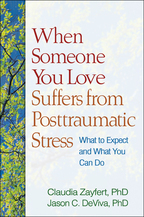When Someone You Love Suffers from Posttraumatic Stress
What to Expect and What You Can Do
Claudia Zayfert and Jason C. DeViva
Paperbacke-bookprint + e-book
Paperback
orderJune 9, 2011
ISBN 9781609180652
Price: $16.95292 Pages
Size: 6" x 9"
For trauma survivors struggling with intense memories and emotions, it often feels like life won't ever be “normal” again. Effective treatments are out there, but the needs of family members are often overlooked. Will the person you love ever get better? What can you do to promote healing? Where can you turn when you just can't cope? From experienced trauma specialists Drs. Claudia Zayfert and Jason C. DeViva, this compassionate guide is packed with information, support, vivid stories, and specific advice. Learn to navigate the rough spots day by day and help your loved one find a brighter tomorrow.
Mental health professionals, see also the related treatment manual, Cognitive-Behavioral Therapy for PTSD.
Association for Behavioral and Cognitive Therapies (ABCT) Self-Help Book of Merit
Mental health professionals, see also the related treatment manual, Cognitive-Behavioral Therapy for PTSD.
Association for Behavioral and Cognitive Therapies (ABCT) Self-Help Book of Merit
“An easy-to-read, comprehensive, research-based resource. This book is filled with practical advice.”
—Andrew Christensen, PhD, coauthor of Reconcilable Differences
“Finally, a resource for all sufferers of PTSD and their families and friends. As the wife of a veteran and an advocate who works with families dealing with combat trauma, I have been searching for a book like this. It provides up-to-date information that is relevant for readers worldwide. This book will save many relationships. It's not a book to borrow; it's one you have to own!”
—Donna Reggett,Head Advocate, Ipswich District Veterans' Support Centre, Australia
“Zayfert and DeViva are to be applauded for recognizing the ripple effects of trauma on loved ones, and their important role in the recovery process. Readers will find this book easy to understand and useful in making sense of their loved one's symptoms and behaviors. Drawing on their extensive clinical experience, the authors provide an array of examples that bring the effects of trauma on individuals and relationships into sharp focus. They also offer straightforward explanations about treatments that work. Anyone who cares about someone who has been traumatized will be grateful for this book.”
—Candice M. Monson, PhD, Department of Psychology, Toronto Metrolitan University, Canada
“I only wish that I had had this book when my husband and I were dealing with the full force of his PTSD last year. My husband is heading to Afghanistan for his third tour any day, and after reading this book, I feel more prepared to handle any symptoms that may re-emerge when he returns. The book helped me understand what he was going through and give voice to my own feelings and struggles. The authors provide actual strategies for dealing with the symptoms and making sure that everyone's needs are met, not just the survivor. Just fabulous!”
—M.C.
“Being in a relationship with someone with PTSD is extremely hard. I was constantly wondering what I was doing wrong and why my fiancé was upset. This informative book helped me understand exactly what PTSD is, why it isn't always me that is causing the problem, and why I can't just 'fix it.' It is a great resource for those looking for help in understanding their loved ones. I learned how I not only can help my fiancé, but also can help myself.”
—B.M.
Table of Contents
IntroductionI. Understanding Posttraumatic Stress
1. What It Feels Like to Live with a Trauma Survivor
2. How Trauma Affects Survivors
3. Why Is Your Loved One Stuck in the Past?
4. Treatments That Can Help with PTSD and Other Problems
5. Finding a Therapist
II. Helping Yourself, Helping the Survivor
6. Taking Care of Yourself
7. Setting Limits
8. Communicating Your Needs
III. Coping with Specific Traumas
9. When Someone You Love Has Been Sexually Assaulted
10. When Someone You Love Has Been to War
IV. Putting Your Lives Back Together
11. Reconnecting with Your Partner and Helping Your Children
12. Recovery and Beyond
Resources
About the Authors
Claudia Zayfert, PhD, a clinical psychologist, is an internationally renowned expert in cognitive-behavioral therapy who has worked with trauma survivors for over 20 years. She is Associate Professor of Psychiatry at Dartmouth Medical School and Director of the Anxiety Disorders Service at Dartmouth-Hitchcock Medical Center in Lebanon, New Hampshire.Jason C. DeViva, PhD, is a clinical psychologist in the VA Connecticut Health Care System, where he works extensively with veterans returning from Iraq and Afghanistan. Dr. DeViva is on the faculty of the University of Connecticut School of Medicine and Yale School of Medicine. He has treated both veterans and civilians with posttraumatic stress disorder and related problems for over a decade.
